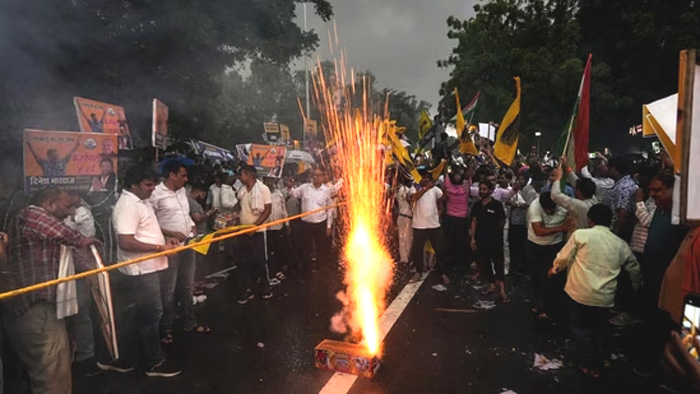FIR over firecrackers burst outside Arvind Kejriwal’s house after Tihar jail release
The Delhi Police on Saturday registered an FIR after firecrackers were burst outside chief minister Arvind Kejriwal’s residence in Civil Lines, north Delhi, following his release from Tihar jail, officials said on Saturday, PTI reported.
The Supreme Court granted bail to Kejriwal in the CBI’s Delhi excise policy corruption case after he had spent over five months in jail.
Why FIR on bursting firecrackers?
The Delhi government had earlier announced a ban on the production, sale, and use of firecrackers to control winter air pollution.
A case under Section 223 (disobedience to orders) of the Bharatiya Nyaya Sanhita was filed at the Civil Lines Police Station against unknown persons for violating the ban, an official said.
Firecrackers were set off outside the CM’s residence on Friday evening, shortly after his release from Tihar Jail.
Delhi BJP president Virendraa Sachdeva said, “The leaders of AAP make announcements whenever there is Diwali or any other festival of Hindu religion. Delhi minister and AAP leader Gopal Rai should take cognizance of the matter. A day before yesterday, he gave statements about banning firecrackers by February 2025. And yesterday, firecrackers were burnt in front of the CM. All the restrictions are for the Sanatan Dharma only. However, the court has permitted to burn green firecrackers.”
Arvind Kejriwal gets bail, but can he still perform his duties as CM?
The Supreme Court granted bail to Arvind Kejriwal but set certain limitations.
Delhi chief minister Kejriwal must submit a surety bond of ₹10 lakh as part of his bail conditions. He is prohibited from making any statements about the Delhi excise policy case.
Kejriwal is also barred from entering the chief minister’s office or the Delhi Secretariat. He can’t sign official documents unless absolutely necessary to obtain the Lieutenant Governor’s sanctions. He must also attend trial sessions unless granted exemption by the court.
Kejriwal must file an application if he wishes to modify these conditions, according to his lawyer Rishikesh Kumar, who said that the Supreme Court may alter the restrictions imposed in the Enforcement Directorate (ED) case.
Kejriwal was arrested by the ED on March 21, 2024, as part of a money laundering investigation linked to alleged irregularities in the now-scrapped Delhi excise policy for 2021-22. The CBI later arrested him on June 26, 2024, while in ED custody.


Comments are closed.